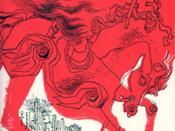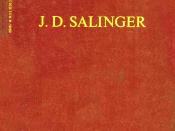Censorship
One particular English teacher wanted to have her students read The Catcher in the Rye, but was aware of the profanity described in the novel. Worried that the parents might oppose, she asked permission of the parents, and most of them seemed fine with it. Of course, later on, someone complained and the school board voted to ban the book from being read in the district.
The teacher made a point that censorship does not make bad things go away, it just prolongs the time before their kids would be exposed to it, if anything. Holden Caulfield tried to do the same thing for his sister, trying to protect her from the profanity. He realized that one person can not possibly protect children from bad things. She will just experience the pain later in life, when it might affect her more. The parents of Shelley Keller-Gage's English students should learn this lesson.
Censorship in general is an awful thing. Although we are guaranteed free speech, there is no point in having free speech if nobody is allowed to listen. There is nothing that we can gain by not reading a book, but there are many things to lose. We can never hear that point of view on life, or ever learn the lessons in that author's own words. Anything that we could possibly be protected from in a book we will surely see or hear somewhere else. If profanity is something worth avoiding, then maybe I shouldn't go to school, or for that matter, ever leave the house again. If my parents were that dedicated to making sure I never heard a profane word in my life, I would have to be locked up in my bedroom, with no access to television, newspapers, a computer, books, magazines, or...



Okay, i guess
this essay is okay. if it had some more factual statement i think it would be better. i felt like this essay was mostly opinion but it wasnt that bad
4 out of 4 people found this comment useful.